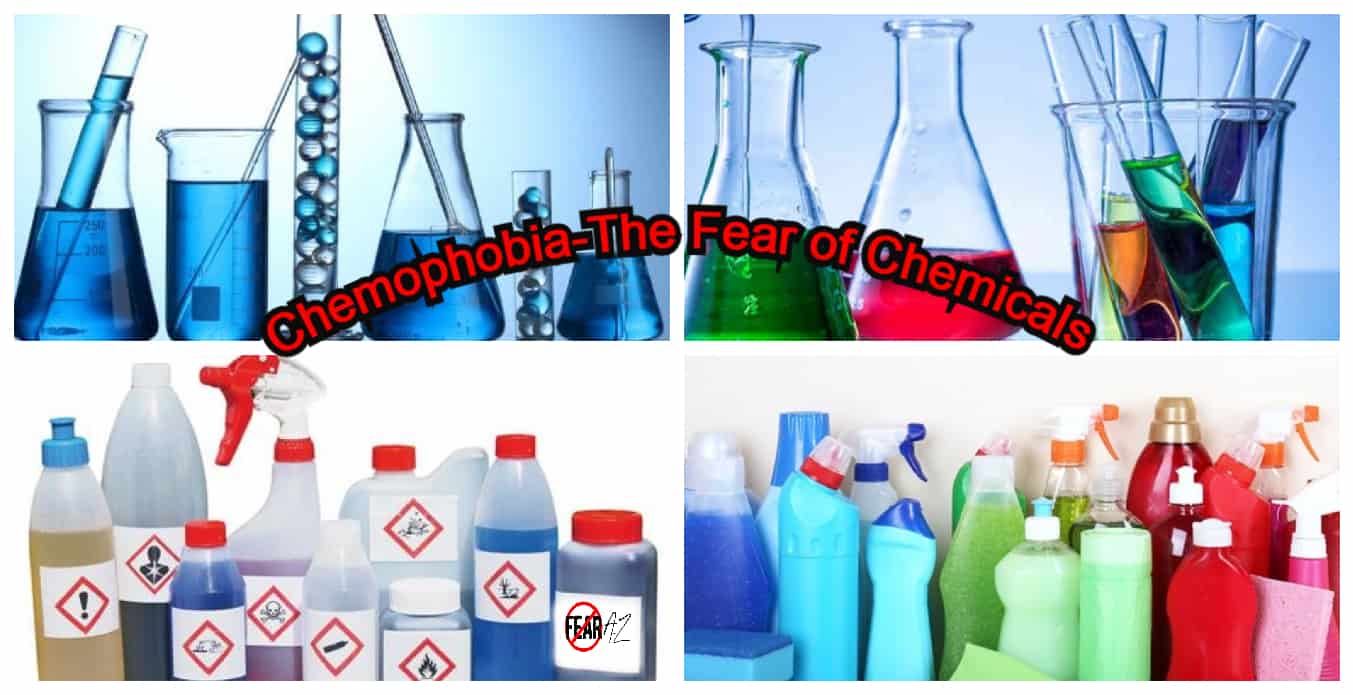Share This Article
The Excessive Fear of Chemicals
Do you find yourself shaking in fear when it’s time to wash your hair? Does the prospect of taking medication stain your clothes with perspiration?
If that is the case, you may have chemophobia.
Chemophobia is the fear of chemicals. And what is the fear of chemicals? It’s typically a fear of the unknown. It develops because of not knowing what chemicals are in your shampoo, medicines, or any products you use on a daily basis.
Sometimes, the fear could also be a result of misinformation or misconception, especially about what the word “chemical” means.
Chemicals make up almost everything we interact with. Our food and beverages contain chemicals, as does our cleaning equipment. Even our soaps and shampoos are chemically based. While we can’t just stop using these products, identifying chemophobia at an early stage can help address it.

Causes of Chemophobia
According to the American Council on Science and Health, chemophobia often results from scary stories, exaggerated claims, and misinformation gathered from sources that may not be reliable.
Not long ago, if one was sick, they would simply visit a doctor and take the medication prescribed without question. If they did have questions, the doctor was the only qualified person they could ask.
However, with the rise of the internet, we now have access to countless opinions and alternative takes on any given subject. And with plenty of marketers and influencers trying to sell you their products, services, or concepts, people are often misled into believing potentially dangerous ideas.
Studies have also shown that personality traits such as paranoia can play a major role in the development of chemophobia. Such paranoia contributes to the cultivation of falsehoods or confusions about chemicals. And when a person is confused about whether or not it is safe to use a particular chemical, they avoid it. Not because they believe the falsehood but because there’s a zero percent chance of anything bad happening with a chemical you don’t use. They simply don’t want to take the risk.
Why Is the Fear of Chemicals Irrational?
While a healthy dose of skepticism is important when deciding what to consume and what not to, too much of it can paralyze you and significantly impact your everyday life.
Chemicals are everywhere and in everything. What’s classified as “synthetic products” are made from chemicals found in nature; they simply go through additional processing.
Decades of media attention and rumor have assigned a negative connotation to the term “chemicals.” And many companies today use this to their advantage by advertising their products as “chemical-free” or “100% natural,” even though what you’re getting, be it skin lotion or painkillers, are still technically chemicals.
Chemophobia Symptoms
Life can be difficult when you don’t trust the integrity of the manufacturers that make the chemicals we need and use every day.
Chemicals are essentially anything from the material world. Some chemicals are safe, and some are unnecessary and dangerous. Since not all of us can have all the information we need to make our choices, we have to rely on scientists and regulatory bodies. These groups research and approve the chemical products introduced into the market and work to ensure our safety.
But to someone who fears chemicals without any scientific basis, the sight or even the thought of chemicals can trigger an emotional response. This is a serious problem. Those who suffer from chemophobia are likely to fall prey to false marketing and may end up consuming unapproved, harmful products.
If you want to determine whether you may have chemophobia, here are some symptoms to look for:
Physical Symptoms
- Muscle tension
- Hypersensitivity
- Avoiding essential medicines
- Panic attacks
- Dizziness
Mental/Emotional Symptoms
- Depression
- Paranoia
- Anxiety around chemicals or when thinking about chemicals
How Do You Deal with Chemophobia?
The fear of chemicals is not completely irrational. Hazardous chemicals do exist, so there’s good reason to be cautious of them to an extent. But you cross the line from caution to phobia when your response to the very idea of chemicals is emotionally fueled and lacking in knowledge.
This is why it’s important to acknowledge that you may have a problem. Then you can learn to deal with chemophobia.
Self-Help: What Are the Options?
The source of this fear is usually misconception. We fear what we don’t understand, and that’s normal. It’s nothing to be ashamed of. So the best way to go about helping yourself overcome chemophobia is to educate yourself on the products you’re consuming.
Make sure you consult reliable sources—physicians, chemists, and researchers—instead of getting your takes from outlets that don’t provide solid evidence to support their claims. Get your information from reputable sources such as the food, drug, or cosmetics regulatory institutions in your country.
The world has no shortage of paid actors and con artists, which is something you probably already know. The doors of scientific discourse are open to everyone. However, sometimes under the rigors of the scientific process, individuals can’t back up their tall claims about specific chemical products. They resort to deception to market their ideas or alternative products. You need to be vigilant of these types of individuals.

Professional Chemophobia Treatment
Professional treatment for a phobia as complex as chemophobia can include many options. But here are the two most common methods of treatment practiced.
Exposure Therapy
This process works by exposing the individual to the subject of their fear in small but progressive doses over a period of time. So, in the case of chemicals, a therapist will begin with simple stimuli, like a picture of bleach. Depending on the extent of your symptoms, your therapist may move on to stronger stimuli. This can help you practice learning how to manage your anxiety in a safe way.
The therapy may also include visualization exercises where the patient is asked to imagine fictional scenarios involving chemicals. The goal is to desensitize you without giving you more anxiety than you can handle at each stage.
Cognitive Behavioral Therapy
Cognitive behavioral therapy, also called CBT, involves having an open conversation with the therapist to help you uproot your fear. Therapists help patients find the irrational or emotional origins of their fear of chemicals and replace them with more rational thoughts.
These sessions aren’t about debunking your ideas about the specific chemicals you use. You may be correct and aware of the hazards of certain chemicals. The therapy is aimed at reducing the overall fear of chemicals that hinders you from enjoying a good quality of life. It’s important to come in with an open mind for these sessions to make the most of them.
Coping with Chemophobia in the Long Term
As with any phobia, overcoming chemophobia can take time. It’s not an easy process. And don’t worry, you don’t have to start trusting bleach and oven cleaners tomorrow. But make sure you take the time to set reasonable goals and milestones and follow them.
Many times people with phobias tend to lose hope and give in to their fears by setting up walls between them and the subject of their fear. This, however, results in them restricting the quality of their own life. They become unwelcoming of anything unfamiliar including other people and refuse to seek medical treatment.
That’s why it’s important to keep a trusted friend, partner, professional, or family member in the loop. There will always be someone willing to help see you through it.
Final Thoughts
When you need to deal with a phobia, particularly the fear of chemicals, avoid a defeatist approach. There are hundreds of chemicals that are vital to our survival and well-being.
The most important way to deal with chemophobia is to use verified sources to build your knowledge pool. By doing so, you can overcome your fears and help others find the same strength.



